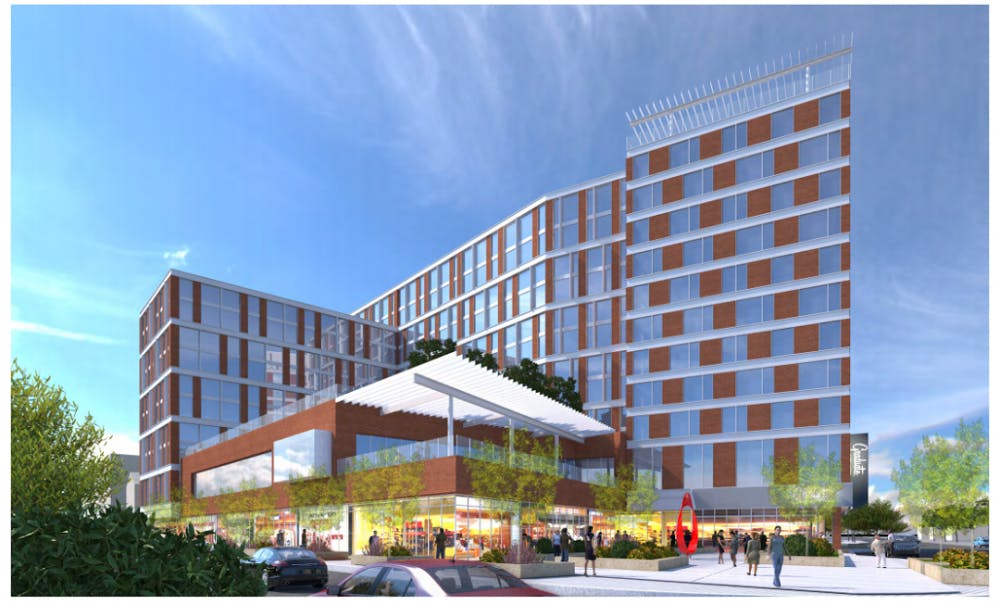After changes to the Park District development project's brownfield reimbursement plan were made at the Jan. 10 East Lansing City Council  meeting, the long-awaited development yet again faces an uncertain future.
meeting, the long-awaited development yet again faces an uncertain future.
While council took a step forward by approving the project’s site plan and brownfield plan last week, Chicago-based developer Convexity Properties is experiencing cold feet after council amended the reimbursement plan to provide fewer monetary incentives.
The Lansing State Journal reported that David Pierson, attorney for Convexity, said the project was not feasible under the new plan.
Pierson could not be reached for comment at the time of publication.
Under Convexity’s initially proposed plan, they were to receive a tax increment financing, or TIF, abatement of 100 percent of the property tax revenue Park District generates for the city through the next 23 years — starting in 2018 — as reimbursement for development costs. Under the current brownfield plan, 80 percent of Park District’s revenues would go to Convexity for the next 30 years. This allows the city to generate revenue Mayor Pro Tem Ruth Beier said she believes is desperately needed.
“We can’t incur debt for a new development, we’re better off with no development than incurring more debt,” Beier said. “The TIF that we proposed is all that we can afford, and if the developer needs more money than that to do this development, then we can’t do this development. There’s not really a lot more room to do anything about that.”
Beier said there’s more than enough money provided through the amended plan to fund parking and infrastructure improvements for the project, but should Convexity refuse to budge and the project is scrapped, the developer is still legally obligated to tear down the blighted buildings that have long occupied Park District.
Convexity’s original deadline to demolish the buildings was Dec 31. 2016, but at their request the deadline has been extended to Jan 31. and will likely be delayed until March as Convexity wants to keep the buildings up until they receive approval for Michigan Business Tax credits, the Lansing State Journal reported.
Beier, however, said council could order the buildings demolished sometime in February if the deal falls through or Convexity takes too long to commit. Beier said the council can tell the developer to demolish the buildings at any time, but is unsure of how many days notice they would be required to provide.
“If we come to an agreement, then I would be amenable to waiting until March to take the buildings down,” Beier said. “If we don’t come to an agreement on the 31st or very shortly after, I am not amenable to waiting. ... They don’t have a lot of time, because I won’t support continuing putting off the demolition. The demolition needs to happen.”
A development agreement between the two parties is tentatively on the agenda for council’s next general assembly meeting on Jan 31. If passed, the agreement would lay out timelines for the project and things would quickly begin happening, Councilman Erik Altmann said. However, the approved site plan for the project cannot move forward without the development agreement.
Altmann said the development agreement will make the terms between the two parties precise, and both sides will have to decide whether they’re willing to accept them.
“I’m not in the developer’s shoes, I don’t know what’s possible for them and what isn’t possible for them, I don’t know if they’re negotiating or what their strategy is, but there just is a limit to what we can give them, and if that won’t support the kind of project that we’ve been talking about, then we’ll have to find something else,” Altmann said. “I think we and they need to be ready to think outside the box.”
Support student media!
Please consider donating to The State News and help fund the future of journalism.
Discussion
Share and discuss “Park District future still uncertain amid debate over brownfield plan” on social media.
 meeting, the long-awaited development yet again faces an uncertain future.
meeting, the long-awaited development yet again faces an uncertain future.






